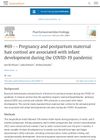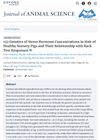 February 2023 in “Malaysian Journal of Science. Series B, Physical & Earth Sciences”
February 2023 in “Malaysian Journal of Science. Series B, Physical & Earth Sciences” Analyzing bear poop helps measure their stress without harming them.
 August 2022 in “Revista de la Universidad Industrial de Santander/Salud UIS”
August 2022 in “Revista de la Universidad Industrial de Santander/Salud UIS” Stress-related hair loss was reversed with a special medication.
 December 2020 in “Current Sexual Health Reports”
December 2020 in “Current Sexual Health Reports” Finasteride can have lasting negative effects on brain function and behavior by disrupting neurosteroid production.
 January 2017 in “Journal of cosmetology & trichology”
January 2017 in “Journal of cosmetology & trichology” A man with severe hair loss regrew hair after hormone treatment.
44 citations,
February 2016 in “Zoology” Hair cortisol levels in primates are useful for stress assessment but vary by age, sex, species, and hair collection methods.
 1 citations,
July 2023 in “Psychoneuroendocrinology”
1 citations,
July 2023 in “Psychoneuroendocrinology” Hair cortisol is a reliable marker of long-term cortisol levels and is linked to daytime saliva cortisol but not morning levels.
1 citations,
December 2021 in “American Journal of Obstetrics and Gynecology” Hair cortisol levels peak in the third trimester and decline postpartum.
 February 2024 in “Psychoneuroendocrinology”
February 2024 in “Psychoneuroendocrinology” Mothers with lower stress during pregnancy but higher stress after birth had infants with lower development scores.
43 citations,
October 2005 in “Molecular and cellular endocrinology” Hair melanocytes help the skin respond to stress and regulate hair pigmentation.
 6 citations,
May 2022 in “Frontiers in Medicine”
6 citations,
May 2022 in “Frontiers in Medicine” The study suggests pandemic stress might worsen or trigger hair loss problems.
 5 citations,
April 2022 in “Journal of Chromatography B”
5 citations,
April 2022 in “Journal of Chromatography B” The new method can measure sleep-related hormones in hair effectively and could help track long-term sleep patterns.
August 2022 in “Metabolic Brain Disease” Ferulic acid may help control menstrual cycle-related epilepsy by affecting female hormones.
 9 citations,
January 2017 in “International Journal of Trichology”
9 citations,
January 2017 in “International Journal of Trichology” The study suggests that mast cells might be involved in the hair loss condition telogen effluvium and could be a target for treatment.
5 citations,
January 2021 in “PeerJ” Elephant tail-hair can show past stress levels, matching times when stressful events happened.

Combining stress management and Minoxidil helps treat stress-related hair loss and improve well-being.
July 2024 in “Behavioural Brain Research” Long-term finasteride treatment reduces depression and brain issues in obese male rats.
 November 2023 in “Journal of animal science/Journal of animal science ... and ASAS reference compendium”
November 2023 in “Journal of animal science/Journal of animal science ... and ASAS reference compendium” Pig hair cortisol levels are inheritable and linked to stress responses, which could help select for more resilient pigs.
 January 2022 in “Journal of family medicine”
January 2022 in “Journal of family medicine” Polycystic Ovarian Syndrome (PCOS) can cause chronic inflammation, mental health issues, and changes in gut bacteria, but a holistic lifestyle change can significantly improve these conditions.
 January 2019 in “Obstetrics & Gynecology International Journal”
January 2019 in “Obstetrics & Gynecology International Journal” Hormonal changes and conditions like polycystic ovarian syndrome are major causes of adult acne in women, with varying prevalence among different ethnicities.
January 2019 in “Frontiers in neurology” A nutrition program improved a young woman's concussion symptoms.
32 citations,
January 2017 in “Physiology & Behavior” New hair growth corticosterone levels are higher in diabetic mice, indicating long-term stress.
16 citations,
January 2021 in “Frontiers in veterinary science” Pigs in farrowing crates and loose-housing systems showed no difference in chronic stress levels as measured by hair cortisol.
3 citations,
November 2021 in “Stress” Girls had higher stress hormone levels during school due to social and emotional issues, while boys had higher overall hormone levels with slight changes when school started.
106 citations,
January 2013 in “Clinical and Developmental Immunology” Alopecia areata is caused by immune system attacks on hair follicles, often triggered by viral infections.
102 citations,
July 2020 in “International journal of molecular sciences” Hormones like testosterone and estrogen significantly affect hair growth and structure.
58 citations,
March 2011 in “Pflügers Archiv für die gesamte Physiologie des Menschen und der Tiere/Pflügers Archiv” Hormones and signaling pathways control sebaceous gland function and could help treat acne.
29 citations,
February 2011 in “PloS one” Astressin-B can reverse and prevent hair loss in stressed mice.
25 citations,
May 1972 in “Canadian journal of zoology” Black-tailed deer have four types of pelages and molt twice a year.
16 citations,
January 2014 in “Obesity surgery” Vertical sleeve gastrectomy improved metabolism, behavior, and reproduction in obese rats with PCOS.
 10 citations,
September 2022 in “Psychiatry and Clinical Neurosciences”
10 citations,
September 2022 in “Psychiatry and Clinical Neurosciences” Long COVID affects over half of COVID-19 survivors, causing a range of symptoms like fatigue and neurological issues, with no specific treatment yet.














